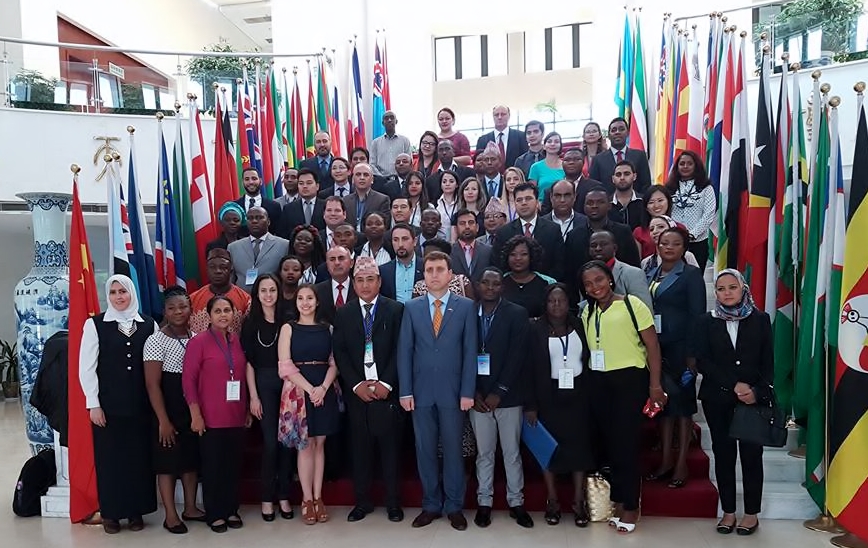“Perspectives on doing business with China”
November 24th, 2016 China’s economic growth has garnered international attention and debate. Latoyaa Roberts-Thomas, 29, a Commonwealth Correspondent from Trinidad and Tobago, had a chance to examine the issue from China’s perspective.
China’s economic growth has garnered international attention and debate. Latoyaa Roberts-Thomas, 29, a Commonwealth Correspondent from Trinidad and Tobago, had a chance to examine the issue from China’s perspective.
I was privileged to visit China recently for a trade and investment seminar through the Ministry of Commerce, People’s Republic of China. Initially, I wondered how beneficial was it to bring representatives from over thirty developing countries to explore China, as based on the trends in the global economy everyone readily knows about China.
In common parlance, “China is everywhere”, so I questioned what else was there to be known. After spending three weeks in China during the summer of 2016, however, my perspectives on the growing economy changed and some misconceptions were alleviated.
The first issue that remains in my mind is appreciating China’s level of growth as the “new normal”. Within the last decade, China’s growth has always been double figure digits and some scholars speculated that the country’s economic expansion at such a rapid scale may have led to China becoming exhausted or over-burnt.
Today, China’s economy is still growing, though at half the pace of a decade ago. Now at averaging six to seven per cent annual growth rate, China is still the fastest growing economy in the world and second largest to the United States. At this growth rate it is believed that China can engage in more sustainable and balanced development, and it is anticipated for this to be the “new normal” for a couple of years to come.
Though one of the fastest-emerging economies in the world, poverty alleviation is still a burden for the country. On my visit to huge municipalities such as Beijing and Chongqing, I was amazed at how these cities were rapidly developing. On first glance, one would not think otherwise than China being a first world nation. Many major international trading companies can be seen established in these global cities, large scale infrastructure and development projects are on-going and high investment in the nation’s capital was evident.
On the flip side, with development comes managing the economic disparity. There are many rural and suburban areas in this great nation that are still faced with grave economic challenges daily. Though thousands are raised out of poverty-stricken circumstances daily, using the measure of poverty meaning person living with an income of less than $USD 1.25 per day, there is still 1.9 per cent of the country’s population of 1.37 billion persons living in poverty (World Bank, 2013). That is an extremely large figure to conceptualise. We must understand all the other economic and social challenges that emerge due to poverty.
Questions of China’s oversea assistance in many developing countries also engages a fruitful debate when one consider issues such as competitive labour market supply, Chinese dumping of materials, or technical support. Ironically though, China is still one of the smaller contributors in the world to overseas aid and investment in comparison to other countries such as USA, Britain, France or Japan. In essence, China is in many dimensions still a newcomer to the game as opposed to many that have been at the forefront of global economy in the past decades. Yes, China is expanding its overseas assistance in many regions, but so far it has only surpassed other donors in aid to the African region.
Being in China led me to understand the country’s developmental path from a different lens. It also made me explore some issues that are critical to the growth of China in the world economy debate. The government of the People’s Republic of China, through the Ministry of Commerce, arranges a series of seminars yearly that invite representatives from various government ministries throughout the globe to experience and understand China’s role in the global economy. The three-week seminar uncovers issues such as strategies for poverty alleviation, facilitating trade and investment, understanding China’s political landscape, developing strategies for free trade zones and utilizing Foreign Direct Investment and China’s foreign aid.
The overall aim of such activities is to build a greater appreciation for China’s role in the global economy. It is anticipated that by foreign nationals attending such seminars, the relationship between China and other countries will continue to strengthen. Furthermore, China continues to support a win-win strategy as the country advances in the global economy but sees the need for continuous co-operation, especially with other developing nations that may face similar challenges to its own .
……………………………………………………………………………………………………………………………………
About me: I work as a Communication Officer at the Division of Tourism and Transportation, Tobago House of Assembly in Trinidad and Tobago. I hold a first Degree in Communications Studies with Linguistics and International Relations and a Masters in Global Studies. I am currently pursuing a M.Phil in International Relations. I have a passion for youth development but also internal relations, and I like travelling the world.
……………………………………………………………………………………………………………………………………
Opinions expressed in this article are those of the author and do not necessarily represent the views of the Commonwealth Youth Programme. Articles are published in a spirit of dialogue, respect and understanding. If you disagree, why not submit a response?
To learn more about becoming a Commonwealth Correspondent please visit: http://www.yourcommonwealth.org/submit-articles/
………………………………………………………………………………………………………………………………………………………………




